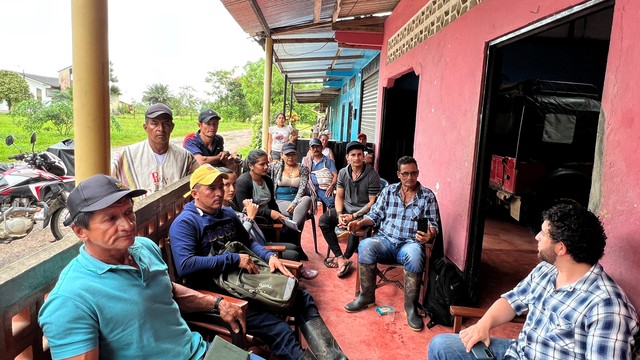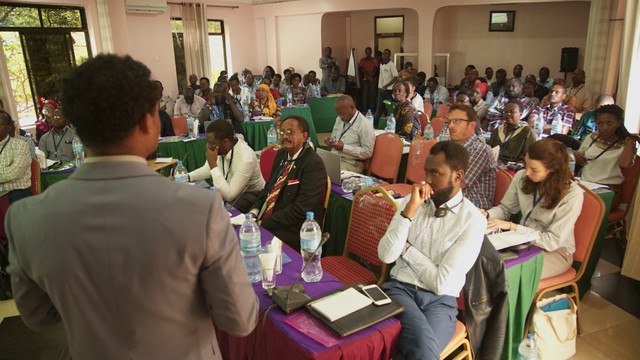Partnerships and collaboration for a more responsible minerals sector
Transitioning to a more sustainable and inclusive economy that will deliver the SDGs requires increased consideration of the social and environmental impacts of supply chains.

After touring mine sites in Geita, one of Tanzania's main gold-producing regions, participants in an IIED-organised workshop on how to make artisanal and small-scale mining in the country more sustainable, ask questions of the sites' directors and mineworkers (Photo: Steve Arnau/IIED)
Mineral supply chains have particularly significant impacts, both on the environment and on the conditions of workers in these supply chains. IIED's work on sustainable mineral markets targets government and private sector policymaking to ensure a focus on inclusion and equality.
Our current work on building a more responsible minerals sector includes:
Membership of the European Partnership for Responsible Minerals (EPRM)
The EPRM is a multi-stakeholder partnership working to increase the proportion of responsibly produced minerals from areas that are affected by, or at high risk of, conflict. It supports responsible extraction of minerals that contribute to local sustainable development.
The EPRM was set up as an accompanying measure to the European Union Conflict Minerals Regulation. This regulation calls on importers of gold, tin, tantalum and tungsten into the EU to demonstrate that they comply with the standards required by the OECD Due Diligence Guidance.
Since legislation alone is not enough to bring about improved practices in mine sites and more responsible sourcing practices, the European Commission has tasked the EPRM to:
- Support mine sites to produce more responsibly and gain access to formal local and international markets through project funding
- Support companies to improve their due diligence practices to source gold, tin, tungsten and tantalum more responsibly through resources and capacity building, and
- Link producers and supply chain actors to promote sourcing from artisanal and small-scale (ASM) mining producers in conflict-affected areas.
IIED serves on the EPRM’s governance board and co-chairs the civil society pillar and the outreach working group.
The EU Conflict Minerals Regulation entered into force in January 2021. In December 2020, together with the Alliance for Responsible Mining (ARM), IPIS and Solidaridad, IIED consulted with around 50 civil society organisations in 20 countries that produce gold, tin, tungsten and tantalum to understand their views about the regulation, and the ways in which it could support their work.
Some of the key conclusions that emerged include:
• The need to build knowledge of the regulation in producing countries, especially beyond the Great Lakes region in Africa. For the regulation to bring about positive changes, there needs to be more local understanding of what it entails and of due diligence processes more broadly. This is a first step to make sure that local actors are engaged in putting them into practice.
• The need to leverage the action that matters at the local. The regulation could create momentum towards more responsible and productive mining practices. It could also trigger action and mobilise resources to address other issues important to mining communities, for example women’s empowerment, environmental safeguarding and wider local economic development. But how to leverage the regulation to achieve this is not yet clear.
• The process needs to be inclusive and fair, with all actors playing their part. It is essential that the costs, both direct and indirect, of implementing the regulation are borne fairly by all players across the supply chain, and that all actors, including governments in producing countries, play their part.
Hear directly from some of the civil society organisations in this video (contributions from Isabel Blandón from Fundación Atabaque (Spanish website), Colombia; Nouhoum Keita from ASFA 21, Mali; and Lynn Gitu from IMPACT, Uganda).
Engagement with the Global Battery Alliance’s Cobalt Action Partnership
Responsible cobalt supply chains are necessary for climate change objectives and the transition to green energy. They are also essential to bring about local sustainable development in cobalt-producing areas.
Stakeholders across the supply chain – from mine to end product – need to work together to make sure that today’s all-time high demand for cobalt does not leave local producers and communities behind.
IIED is a member of the Global Battery Alliance and an active partner in its Cobalt Action Partnership (CAP). The CAP is a coalition of diverse organisations from the private sector, civil society and governments, including the government of the Democratic Republic of Congo (DRC), who are working together to foster more responsible cobalt value chains.
Together, CAP partners promote supply chains that are transparent, verifiable, and address child and forced labour, as well as key sustainable development issues such as gender equality, environmental safeguarding and local economic development. IIED has been an active contributor to the CAP, providing advice and support on stakeholder engagement and communications, particularly aimed at supporting local stakeholders.
In parallel, the DRC NGO Afrewatch and IIED are conducting a preliminary mapping of the political economy and policy framework of ASM cobalt in the DRC, to better understand local priorities for sustainable development, and to identify the possible impacts of proposed reforms.
This research is funded by the Sustainable Markets Foundation and undertaken independently. IIED will share insights with the CAP so it can use this evidence to inform its work.
ASM in Honduras
We are partnering with ARM and other organisations on an EPRM-sponsored project to scale up CRAFT and Fairmined initiatives in Honduras.
The project aims to prepare ASM stakeholders for implementation of the EU regulation on conflict minerals; improve practices in mineral supply chains; and improve livelihoods and working conditions for ASM miners, through responsible gold production using the CRAFT and Fairmined standards.
Using our dialogue methodology, we will lead a multi-stakeholder dialogue process, including ASM miners and other supply chain actors and government officials, to support mutual learning and continued collaboration during the project lifetime and beyond.
Additional resources
Long read: Encounter of ASM miners in the Amazon
2020 State of the Artisanal and Small-Scale Mining Sector (PDF), Delve, pages 148-151



